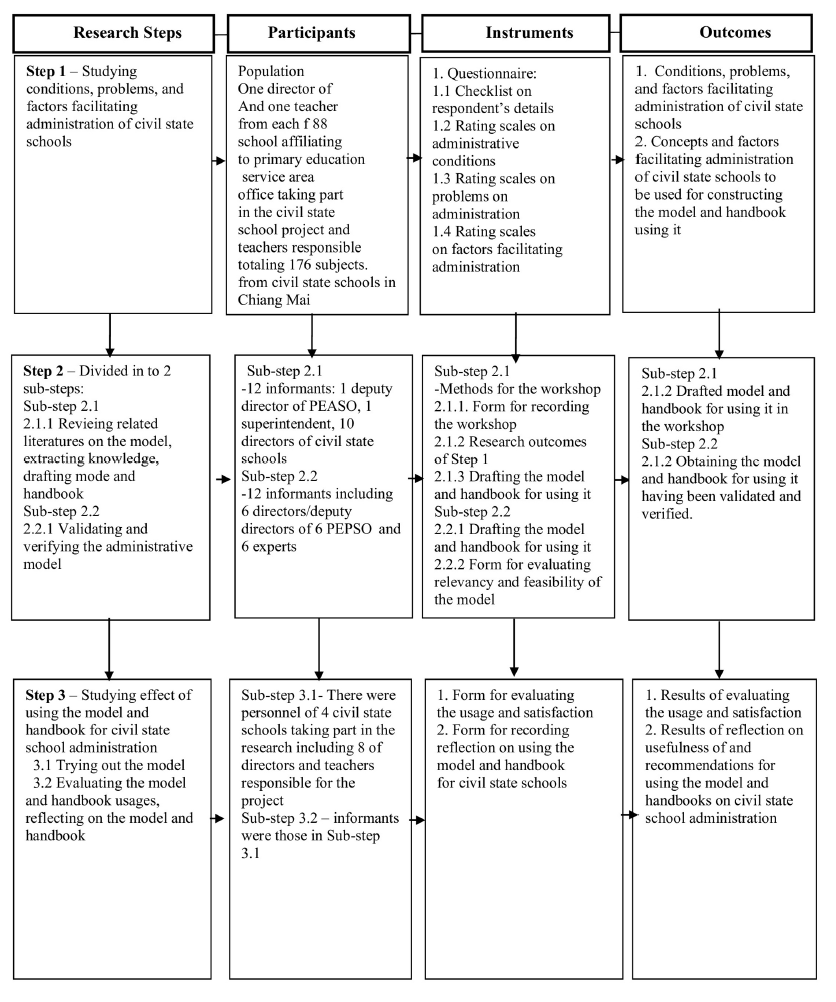Administration model of civil state schools to improve the quality of education
Main Article Content
Abstract
The research was to study the conditions, problems, and factors supporting the administration of civil state schools and to develop a model of administration and study the effects of using the model. The research instruments included, the questionnaire, the form for the minutes of the workshop, the form for checking appropriateness and feasibility of the drafted model, drafting the handbook for using the model, the form for evaluating the model's usage, the form for evaluating satisfaction when using the model, the form for recording the reflection on the model's usage.
The population were 88 civil state schools in Chiang Mai Province. The 176 informants in this study consisted of 88 school directors and 88 teachers from each civil state schools. The twelve informants who gave the information for developing the model composed of one deputy director from the Primary Education Service Area Office, one superintendent, ten administrators from civil state schools. The twelve informants who validated the relevancy and feasibility included six directors of the Office of Educational Service Area and six experts. The informants giving information to study the effect of the use were school directors and teachers being responsible for civil state schools and volunteering to take part in using the model and the handbook. The data was analyzed using frequency, percentage, mean, standard deviation, and content analysis.
The findings revealed that the administration of civil state schools had practical feasibility at a high level when presented in a descending order of the mean being the budget administration, the personnel administration, the academic administration, and the general administration, respectively. The supporting factors were at a high-level also, when ranked in a descending mean, being, the administration, the materials, the budget, and the personnel. The civil state school administration model was the principle, the objectives, the system, the mechanism, and operational methods of quality administration along with the PDCA model including Plan, Do, Check, and Act, accessing the guidelines and the success conditions.
The results were at a high level and with satisfaction being the highest. The reflection revealed that the model and its handbook were useful for administering in civil state schools to assure its effectiveness and efficiency. Also, the administrators had knowledge and understanding of the principles and theories of administration and the administration policy of the civil state schools. The teachers and educational personnel, the basic education school board members, the parents, and the community network understood the civil state school administration policy and participated in developing the policy regarding their roles. Additionally, the school administrators used the model and handbook on school administration as a tool to administer their schools with effectiveness and efficiency.
Article Details
References
K. Arundee, Y. Yaboonthong, C. Puthaprasert, Operational guidelines in accordance with the key performance indicator of the civil state schools under the office of Chiang Mai primary education, The Journal of the Veridian E-Journal, Silpakorn University 11(2) (2018).
K. Arundee, Guideline for operation along indicators of civil state school affiliating to Chiang Mai office of primary education service area, Independent Study, Master of Education, Graduate School, Chiang Mai University, 2018.
W. E. Deming, Quality, productivity and competitive position, Center of Advanced Engineering Study, MIT, Cambridge, MA, 1982.
S. Kemmis, R. McTaggart, The action research planner (3rd ed.), Geelong: Deakin University Press, 1988.
Ministry of Education, Handbook on workshop on guideline for operating the civil state schools -- Project for uniting civil state force in providing basic education and leadership development, May 2--4, 2016.
S. Phanpattanakul, Development of model for administering effective secondary education, Doctor of Philosophy in Educational Administration Dissertation, Sripatum University, 2011.
Regional Education Office No.1, Report on government inspection of ministry of education inspectors office 1 and Bangkok inspection Area, 2017.
T. Runcharoen, Lecture for the seminar on educational administration entitling, Model and factors of model, Ubon Ratchathani Rajabhat University, 2007.
N. Saengnet, Development of administrative model for model schools with good practice, Ministry of Education, Doctor of Education in Educational Administration Dissertation, Faculty of Edcation, Vongchavalitkul University, 2017.
Secretariat of the house of representatives, Report of the committee to promote the country reform on education on creating the area-based civil state mechanism at the field level to carry out participatory education reform, 2017.


